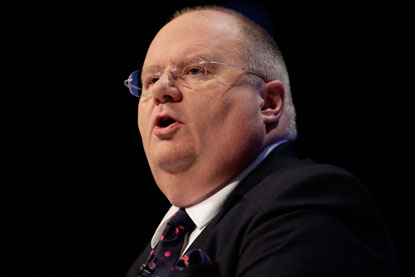By Vivienne Russell | 19 December 2012
Councils in England will have their spending power cut by an average 1.7% next year, in a finance settlement billed a ‘bargain for local authorities’ by Communities Secretary Eric Pickles.
 Pickles said the settlement represented the ‘greatest shake-up of council finance in a generation’, ushering in an era of greater self-determination and financial independence for authorities.
Pickles said the settlement represented the ‘greatest shake-up of council finance in a generation’, ushering in an era of greater self-determination and financial independence for authorities.Councils will share what Pickles called a ‘start up funding assessment’ of £26bn, which includes £11bn in locally retained business rates, as well as £859m in NHS funding for social care, £240m in council tax freeze grant, while £661m will be available through the New Homes Bonus. They are expected to collect almost £24bn in council tax.
Pickles pledged that no councils’ spending power would fall by more than 8.8%, thanks to an Efficiency Support Grant available for councils that improve their services. Next year, councils would have an average spending power of £2,240 per household, he said.
The communities secretary claimed the settlement was ‘fair’ for all authorities. ‘Concerns that those in the North will suffer disproportionately are well wide of the mark,’ he told MPs this afternoon.
The damping system of funding floors would mean an average grant reduction of 3% for upper-tier authorities most dependent on government funding, while the wealthiest would lose up to 8.7% in grant. ‘That’s more support and protection than last year,’ he added.
Pickles said he had listened to councils’ concerns and as a consequence reduced the amounts set aside for the New Homes Bonus, the business rate safety net and academies, releasing an additional £1.9bn in upfront funding for councils this year. Exempting councils from the additional 1% topslice in funding announced by Chancellor George Osborne in the Autumn Statement on December 5 was worth a total of £240m to them.
But looking beyond next year to 2014/15, he said councils needed to improve their performance and efficiency. With the exception of a few, none had ‘got to grips with procurement’, he said, noting that procurement fraud costs the taxpayer £1bn.
Better council tax collection rates, merged back-offices and improved property management would also help councils secure vital savings.
Pickles also published Fifty ways to save today – ‘big and small’ practical ideas to help councils boost their efficiency. He urged councils to implement all 50 suggestions.
On council tax, Pickles said councils had a ‘moral duty’ to freeze it. The tax had doubled under the Labour government and become unsustainable.
He confirmed that this year’s freeze grant would go into the base and urged councils not to dodge local referendums by setting their tax hikes just below the 2% threshold.
Pickles also confirmed that councils would be able to fund any outstanding equal pay claims through asset sales, while they would hear about their public health allocations from Health Secretary Jeremy Hunt ‘in due course’.
Responding to Pickles statement, shadow local government secretary Hilary Benn accused Pickles of ‘living in a world of his own’. Benn asked: ‘Does he not understand the impact his decisions are having on the frontline?
The consultation on the settlement runs until January 15.





















